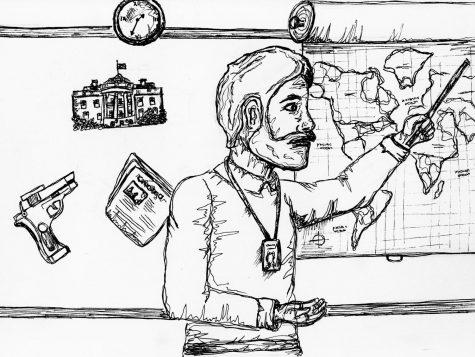Ignorance is not bliss

Tragedy is becoming normal in our lives. With media coverage ranging from local hate crimes to international terrorism, it seems we cannot avoid hearing or seeing news stories displaying acts of inhumanity. But as we see more and more headlines describing violence, we are quickly becoming desensitized to the horrors around us. In order to prevent these tragedies from becoming white noise and fading from our focus, they must be discussed in our classrooms.
Yet, some teachers do not address these topics.
Historical events such as 9/11 and the Holocaust may be discussed at school, but what about more recent incidents like the Santa Fe High School shooting, Pittsburgh synagogue attack or Thousand Oaks mass shooting? While the more notorious events warrant textbook chapters, class field trips and formal presentations, the more recent and horrifying events are rarely covered at school and are simply added to an ongoing list of tragedies.
With continuous acts of violence, it is nearly impossible for teachers to discuss every occurrence. Teachers may not want to spark potential political debate between students. Often, they avoid the subject to prevent students from feeling overwhelmed or emotional in the school setting.
However, sometimes having these difficult discussions can help students comprehend tragedies by experiencing the emotions that are necessary to understand what has happened. With this understanding students are able to grasp the impact of violence in communities within our nation, which may eventually inspire student activism and evoke empathy for those directly affected by tragedy. These conversations need not disclose any political affiliations when providing students with a variety of perspectives if the goal is to reach a higher level of understanding of the situation.
These prominent issues don’t have to be limited to only English or social studies classes. While some classes may not be the most obvious places to talk about world news, it doesn’t take much to incorporate even a brief acknowledgement when fitting.
However, discussion of current events is not only the teacher’s responsibility. Students must also actively pursue exposure to issues in the news and prompt teachers to facilitate important discussions. Students can even have discussions among themselves outside of the classroom. Being actively involved in dialogue about the events can also help students further emotionally process what has occurred.
Students and teachers must welcome the opportunity to delve deeper into current events, regardless of how uncomfortable or saddening they may be.
Our classrooms should not be a place of ignorance when it comes to tragedy.

